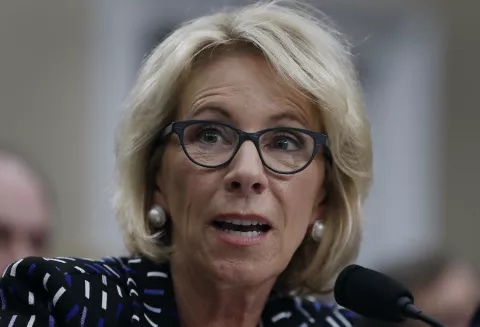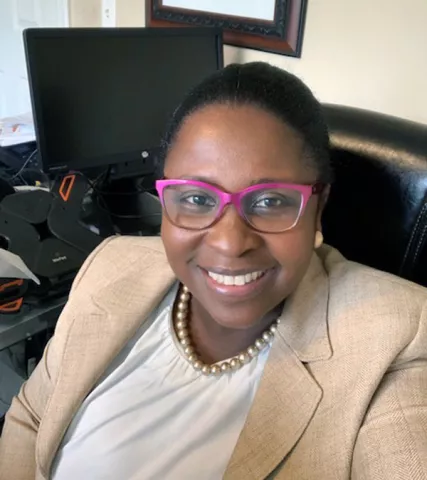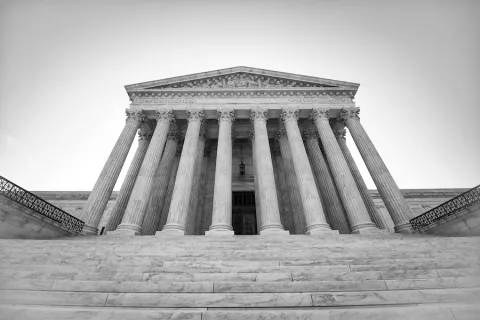
Key Takeaways
- School voucher proponents in statehouses across the country have spent much of the past year working to pass legislation that transfers critical public school funding to the private sector.
- Vouchers harm cash-strapped public schools' ability to provide needed classroom resources for all students.
- Educators in states across the country have rallied against proposed legislation that would transfer public money to private schools.
School voucher proponents in statehouses across the country have spent much of the past year working to pass legislation that transfers critical public school funding to the private sector. Framing these debates around education “reform” and the inauthentic culture wars surrounding public schools, voucher proponents have been steadily working to undermine public education on the state level.
Last year, 22 states either created or expanded school voucher programs. Although this year has only just begun, lawmakers in more than a dozen states who support these initiatives have spent the first few weeks of 2022 drafting or introducing school voucher bills that employ a variety of tactics. Some of these efforts include:
- Alabama: Lawmakers introduced legislation (SB 140) this month to establish “education savings accounts” that give parents approximately $5,500 in state school funding to send their children to private schools. The bill’s sponsor acknowledged it would cost the state’s public schools an estimated $420 million.
- Tennessee: Last month, the Senate Education Committee advanced legislation (SB 1674) that would offer education savings accounts to students whose public schools do not provide at least 180 days of in-person learning as a result of the coronavirus pandemic. Lawmakers did remove a provision from the bill that would have extended vouchers to school districts that have mask mandates.
- Utah: Sponsors of legislation (HB 331), introduced last week, are promoting their proposal as a scholarship program even though it is just another voucher bill. Utah residents previously voted to overturn a controversial school voucher law in 2007 with over 60 percent of the vote.
Given the negative impacts of school vouchers—which divert needed funding from public schools, undermine support for public education, fail to improve the academic achievement of student recipients, and contribute to re-segregation—it’s no surprise that many of the bills that have been introduced refer to these proposals as “scholarship accounts,” “opportunity accounts,” and “tax credit scholarships.” This reliance on soft language that minimizes the toxicity of these programs helps obfuscate the true goal of these school voucher bills, which is to divert funding for public education into private hands.
From Public Schools to Private Pockets
Building off of manufactured outrage over critical race theory and mask mandates in schools, school privatization advocates and right-wing idealogues have pushed for school voucher initiatives under the pretext of providing parents with more control over their childrens’ education.
Wealthy donors, such as Charles Koch and former Education Secretary Betsy DeVos, are continuing to push these efforts across the country through the financial support of dark money groups. Conservative think tanks such as the Heritage Foundation, Manhattan Institute, and Goldwater Institute—all members of the right-wing State Policy Network—and astroturfing groups like Moms for Liberty and Parents Defending Education. These groups are also continuing to tie culture war attacks on public education with the need for school vouchers, furthering their own agendas to privatize education in the process.

As Charles Siler, a former lobbyist for several school privatizers—including the Goldwater Institute and the Foundation for Government Accountability—told The Washington Post last year: “There’s virtually no other initiative in the education space that’s a bigger priority for the right today than creating and expanding unaccountable, unrestricted, universal voucher programs.”
Despite claims that school voucher programs lead to corresponding gains in student success, there has been no credible research to suggest that vouchers improve academic performance. If anything, some programs have been found to have a negative impact on student achievement.
Rather than increasing educational opportunities for students, school vouchers often end up providing false hope for families while also further limiting the ability for already cash-strapped public schools to provide needed classroom resources. And despite proponents’ claims that school vouchers are about expanding opportunities for underprivileged students, the original intent of vouchers was to undermine the racial desegregation of public schools following the U.S. Supreme Court’s Brown v. Board of Education decision.
But even as school privatization proponents continue to push for an expansion of voucher programs, educators are fighting back against their legislative efforts through a mix of litigation, grassroots advocacy, and public awareness campaigns designed to highlight the impact these policies would have on public schools.
South Carolina Educators Fight Privatization
Sherry East, president of The South Carolina Education Association (The SCEA), said that the state’s public education system is under attack from privatizers looking to fill the coffers of private schools.
In 2020, when South Carolina Governor Henry McMaster tried to use $32 million in funding from the Coronavirus Aid, Relief, and Economic Security Act to establish a private school voucher program, SCEA joined a lawsuit arguing that the proposal violated the state constitution.
Although the South Carolina Supreme Court unanimously ruled that the governor’s program violated the state’s constitutional ban on public funds being used “for the direct benefit of any religious or other private educational institution,” state lawmakers are now moving to pass legislation that would nonetheless use public funds to establish a school voucher program.
“I don’t think the general public knows that these types of voucher bills would take money away from public schools,” East said. “Despite the fact that some people want to give money to students so they can attend private schools, we need to show that students can get a great education in our public schools.”
Educators across the state have rallied in opposition to the state Senate’s proposed school voucher bill (S.935), which would use public funds to establish “education scholarship accounts” for students to attend private schools. More than 700 educators, parents, and members of the public have joined The SCEA’s call to action urging lawmakers on the Senate Education Subcommittee to oppose the legislation.

Alana Ward, an educator who has taught in South Carolina public schools since 1996 and who currently serves as the NEA Organizing Fellow with The SCEA—a role in which she helps train members to organize and advocate for the profession—testified before the subcommittee about the dangers of the school voucher bill.
“We need to use our voices however we can—whether it’s by making phone calls, writing letters and emails, or testifying before committees—to make sure that the lawmakers who are making these decisions know the impact they would have,” Ward said. “We might be fighting this fight for a while, so it’s important to consistently show up and speak out.”
In early February, a House subcommittee advanced its own school voucher bill that would use funding from the state’s contingency reserve fund, rather than money from the education budget, to establish the program. But not only does the House bill (H. 4879) fail to address concerns under the South Carolina Constitution about money earmarked for public education being diverted to private schools, it—much like the Senate legislation—would also send public funds to private schools that can pick and choose their students under a limited non-discrimination clause that only blocks them from discriminating “on the basis of race, color, or national origin.” This could allow private schools to discriminate against families and their children based on their religion, as well as legally prevent students with disabilities from receiving access to needed support.
The Senate Education Subcommittee voted Wednesday to advance S.935 out of committee, while also voting against having the bill’s non-discrimination clause include disability or sexual orientation and against an amendment that would have had the program’s funding come from the state contingency reserve fund instead of public schools.
Kentucky Lawmakers Double Down on School Vouchers
Last year, Kentucky’s General Assembly passed a controversial school voucher program (HB 563) by a one-vote margin, overcoming a veto from Gov. Andy Beshear. The pilot school voucher scheme would have provided $125 million in tax credits over five years to individuals and corporations who make donations to “education opportunity accounts” operated by third-party organizations. Low- and middle-income students from Kentucky’s eight most populous counties would have been able to use the funds to pay for private school tuition and other expenses, although donors to the program did not have to come from the covered counties.
The Council for Better Education (CBE)—a nonprofit organization that represents 168 of Kentucky’s 173 school districts—worked with the National Education Association (NEA), the Kentucky Education Association (KEA), and several parents of public school students to file a lawsuit to block the tax credit program from going into effect. Although Franklin Circuit Court Judge Phillip Shepherd ruled last October that the program is unconstitutional under at least two different provisions of the Kentucky Constitution, that hasn’t stopped Kentucky lawmakers from continuing to focus on similar school voucher efforts.
“We’ve seen this happen in other states, year after year, where lawmakers open the door to expanding these types of programs and the numbers just grow and grow.” - Eddie Campbell, president of the Kentucky Education Association
As last year’s bill remains blocked in court, Kentucky lawmakers in the House (HB 305) and the Senate (SB 50) have introduced separate legislation that would expand the previous bill’s tax credit scheme to every county in the state. Both of these new voucher bills would redirect even more public money into private hands than last year’s legislation, with the Senate bill capping the program at $50 million annually and the House capping it at $100 million annually.
Both of these bills would make the program permanent and increase the income eligibility threshold for students, making the program more accessible for higher-income families across the state. The Senate bill would make approximately 70 percent of Kentucky children eligible to participate in the program, while the House version would make roughly 77 percent of children in the state eligible.
Eddie Campbell, president of the Kentucky Education Association, noted that the median household income in Kentucky is around $50,000, which shows that the latest batch of voucher bills “is really just about providing tax credits to those families who can already afford to send their children to private schools.”
“These new bills would double or quadruple the voucher program, and that’s going to have a big impact when you’re talking about the money coming into the state coffer,” Campbell added. “We’ve seen this happen in other states, year after year, where lawmakers open the door to expanding these types of programs and the numbers just grow and grow.”
Campbell said it’s important for educators in any state pursuing school voucher legislation to engage their local communities about the important role that public schools serve in their neighborhoods, and how critical it is to ensure that public schools have the funding they need to serve all students.
The Road Ahead
Beyond the wave of legislation being introduced in statehouses across the country, educators are closely following several ongoing legal challenges that could affect the implementation of school vouchers across the country.
The U.S. Supreme Court is likely to issue a decision this June in Carson v. Makin, a case which could determine whether or not states can restrict public funding of religious schools that would use the money to subsidize religious activities and teaching. The Institute for Justice, a libertarian law firm whose financial backers have included deep-pocketed school voucher proponents like the the DeVos Family Foundation and the Koch brothers, brought the suit on behalf of the plaintiffs challenging Maine’s school funding program for families living in rural school districts that lack public high schools.

The state program gives families public tuition dollars to send their children to schools in other communities—including, in some cases, private schools—but excludes “sectarian” schools that would use public funds to pay for religious instruction and worship.
The NEA, along with the Maine Education Association (MEA) and other unions, filed an amicus brief in the case last year arguing that the state’s current school funding program is constitutional. Grace Leavitt, MEA’s president, said that the effort to expand the Maine program to private religious schools further jeopardizes funding for public schools. She cautioned educators to remain vigilant against any attempts to divert funds away from public education.
“Our public schools need to be funded so all of our students can receive an equitable education,” Leavitt said. “Any program that takes money away from them is harmful to our students and to our system of public education. All public school students deserve a great education right where they live, and anything that’s aimed at destroying that is something we have to prevent from happening.”
As educators push back against the wave of new school voucher bills, proponents of strong public schools are also challenging the constitutionality of existing voucher programs. Last month, about 100 school districts in Ohio filed a lawsuit against the state’s 25-year-old voucher program, which has siphoned roughly $2 billion in state funds to private schools over the last decade. The school districts challenging the “EdChoice Program” say it is subsidizing private schools at the expense of the state’s financially strapped public education system and is leading to the re-segregation of some districts.
And in West Virginia, three public school parents filed a lawsuit last month against the state’s new education savings account law (HB 2013). That measure would establish the broadest school voucher program in the country by making any child entering public kindergarten eligible for an account—which would, ultimately, make all students in the state eligible to participate. The parents’ lawsuit argues in part that the law diverts needed funding from public schools and violates the state Constitution by ignoring the requirement that West Virginia’s school fund be used for “no other purpose whatsoever” than the state’s public schools.



